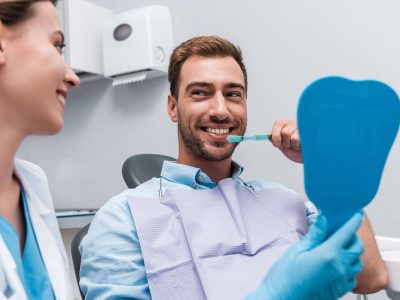Dental anxiety can impact children and adults, but it is manageable if you make frequent checkups. Saratoga dental anxiety is not a diagnosable ailment, nor does it create significant disruptions in everyday life. Instead, it might create physical or psychological symptoms that people identify with going to the dentist, leading them to avoid it entirely. You are recommended to talk with your dentist about various strategies to help you feel more at ease. Moreover, watching TV, having a friend, and even complementary therapies such as hypnosis may help you relax and get through sessions with less worry.
Symptoms of dental anxiety
Dental phobia can cause physical, emotional, cognitive, and behavioral reactions in anxious people. If this is not addressed, the patient may use any reason to miss a dentist visit, promising to reschedule. The longer they can put off going to the dentist, the better (at least in their mind). They will most likely find it challenging to undertake dental treatment, whether primary or complex – even a simple tooth cleaning is likely to cause substantial anxiety. Furthermore, dental anxiety patients may experience the following symptoms:
- Elevated blood pressure
- Sweating
- Difficulty focusing
- Increased or racing heartbeat
- Signs of distress or panic
- An upset stomach.
Various ways of addressing dental anxiety
There are numerous methods for reducing dental anxiety. Here are some alternatives to get you started:
- Distract yourself: Finding ways to distract yourself is an approach to help yourself feel less worried. Wearing headphones, gripping a stress ball, or playing with another tiny portable object can all be examples. Consider your “happy place,” such as the beach or your favorite vacation site, to divert your attention. Some dentist clinics may even offer to turn on the television as a distraction.
- Relaxation tactics: You may use various relaxation methods when at the dentist to assist in alleviating your anxiety. Try deep breathing techniques such as counting your breaths, inhaling and exhaling gently, or body scans in which you concentrate on relaxing the muscles one at a time from head to toe. In the guided imagery method, utilize your imagination to feel calmer. You could also wish to try hypnosis or acupuncture. Hypnosis and acupuncture have been demonstrated in studies to affect how your brain processes pain, with acupuncture in particular showing promise in relieving discomfort following dental surgery.
- Speak to your dentist: Simply being able to express your anxiety can significantly alleviate it. Share your anxieties and concerns with your dentist or hygienist since they are likely to be experienced with this type of anxiety and may be able to tailor the treatments to your specific requirements. Many dentists have methods for calming their customers’ concerns, and they may give you cushions, blankets, a warm neck wrap, and other relaxation aids. Also, don’t hesitate to ask questions regarding any treatment that worries you.
Dental anxiety is relatively frequent in the general community. It has little effect on many people’s willingness to attend the dentist and receive sufficient dental care. Anxiety and, in certain situations, fear of going to the dentist can lead to inadequate care for individuals. This can lead to future oral health concerns needing more extensive treatment and care. People suffering from dental anxiety might reduce their worry by taking small actions. These can include conversations with the specialist, finding diversions, or finding techniques to relax when visiting the doctor.
Discuss with the dental staff at your dental office how you may overcome your dental anxiety together to obtain the oral treatment you require. Call Kiran Rapal, DDS, to schedule your meeting today to determine which dental anxiety therapy is ideal for you.








Comments